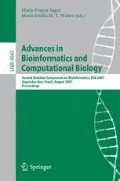Abstract
Coffee is one of the most important commodities worldwide. For this reason, the sequencing in large scale of expressed sequence tags (ESTs) from different tissues of the coffee tree was performed and resulted in the formation of the Brazilian Coffee Genome EST database (CafEST). There is a raising interest of genetic breeding programs in developing varieties of Coffea arabica with increased resistance to nematodes, pests, and diseases. A high number of plant resistance genes (R genes) have already been isolated and classified into six categories denoted as class 1 to class 6. In this study, we show results of a screening of the coffee transcriptome database for class 3 LLR/NBS/TIR-like R gene related sequences within the C. arabica ESTs from the CafEST database. Based on searches for sequence similarities, we selected a total of 293 ESTs coding for class 3 R proteins, putatively related to disease resistance in C. arabica. Among these reads, 101 ESTs, representing the RPP4 subclass, were grouped into 56 clusters. We found 93 reads representing the RPP5 subclass, which were grouped into 46 clusters. In addition, we also found 99 reads representing the RPS4 subclass, which were grouped into 54 clusters. However, no matches were found with other subclasses of R genes (L, M, N, P, and RPP1) so far. These studies should contribute to the elucidation of the recognition and resistance cascades elicited by R genes. These results may provide relevant information to be applied on coffee breeding programs and on the development of new strategies to obtain genetic durable resistance for plants against pathogens, resulting in positive impacts on the coffee agribusiness.
Corresponding author.
Access this chapter
Tax calculation will be finalised at checkout
Purchases are for personal use only
Preview
Unable to display preview. Download preview PDF.
References
Altschul, S., Madden, T., Schaffer, A., Zhang, J., Zhang, Z., Mille, W., Lipman, D.J.: Gapped BLAST and PSI-BLAST: A new generation of protein database search programs. Nucleic Acids Res. 25, 3389–3402 (1997)
Dangl, J.L., Jones, J.D.: Plant pathogens and integrated defense responses to infection. Nature 411, 826–833 (2001)
Gassmann, W., Hinsch, M.E., Staskawicz, B.J.: The Arabidopsis RPS4 bacterial-resistance gene is a member of the TIR-NBS-LRR family of disease resistance genes. Plant J. 20, 265–277 (1999)
Hinsch, M., Staskawicz, B.: Identification of a new Arabidopsis disease resistance locus, RPS4, and cloning of the corresponding avirulence gene, avrRps4, from Pseudomonas syringae pv. pisi. Mol. Plant Microbe. Interact. 9, 55–6177 (1996)
Jones, D.A., Takemoto, D.: Plant innate immunity - direct and indirect recognition of general and specific pathogen-associated molecules. Curr. Opin. Immun. 16, 48–62 (2004)
Meyers, B.C., Diekcman, A.W., Michelmore, R.W., Sivaramakrishnan, S., Sobral, B.W., Young, N.D.: Plant disease resistance genes encode members of an ancient and diverse protein family within the nucleotide-biding superfamily. Plant J 20, 317–332 (1999)
van der Biezen, E.A., Freddie, C.T., Kahn, K., Parker, J.E., Jones, J.D.: Arabidopsis RPP4 is a member of the RPP5 multigene family of TIR-NB-LRR genes and confers downy mildew resistance through multiple signaling components. Plant J 29, 439–451 (2002)
Vieira, L.A.A., Colombo, C., Moraes, A., Mehta, A., et al.: Brazilian coffee genome project: an EST-based genomic resource. Braz. J. Plant Physiol. 18(1), 95–108 (2006)
Videhyasekaran, P.: Fungal pathogenesis in plants and crops. Molecular biology and host defense mechanisms, p. 553. Dekker Inc, New York (1997)
Huang, X., Madan, A.: CAP3: A DNA Sequence Assembly Program. Genome Res. 9, 868–877 (1999)
Tör, M., Brown, D., Cooper, A., Woods-Tör, A., Sjolander, K., Jones, J.D.G., Holub, E.: Arabidopsis downy mildew resistance gene RPP27 encodes a receptor-like protein similar to CLAVAT2 and tomato Cf-9. Plant Physiol. 135, 1–13 (2004)
Whitham, S., Dinesh-Kumar, S.P., Choi, D., Hehl, R., Corr, C., Baker, B.: The Product of the tobacco mosaic virus resistance gene N: similarity to toll and thr interleukin-1 receptor. Cell 78, 1101–1115 (1994)
Author information
Authors and Affiliations
Editor information
Rights and permissions
Copyright information
© 2007 Springer-Verlag Berlin Heidelberg
About this paper
Cite this paper
Campos, M.A. et al. (2007). Identification of the Putative Class 3 R Genes in Coffea arabica from CafEST Database. In: Sagot, MF., Walter, M.E.M.T. (eds) Advances in Bioinformatics and Computational Biology. BSB 2007. Lecture Notes in Computer Science(), vol 4643. Springer, Berlin, Heidelberg. https://doi.org/10.1007/978-3-540-73731-5_19
Download citation
DOI: https://doi.org/10.1007/978-3-540-73731-5_19
Publisher Name: Springer, Berlin, Heidelberg
Print ISBN: 978-3-540-73730-8
Online ISBN: 978-3-540-73731-5
eBook Packages: Computer ScienceComputer Science (R0)

